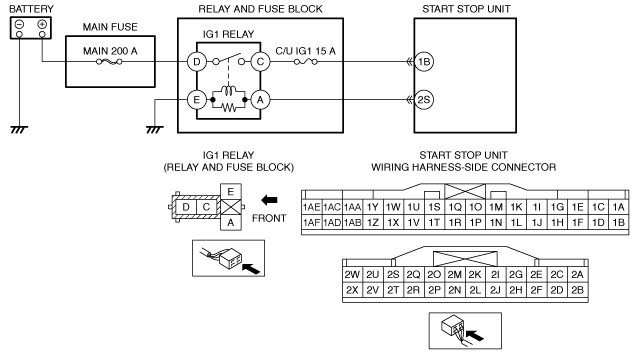|
1
|
INSPECT IG1 RELAY
• Switch the ignition off.
• Disconnect the negative battery cable.
• Is the IG1 relay normal?
|
Yes
|
Go to the next step.
|
|
No
|
Replace the IG1 relay, then go to Step 6.
|
|
2
|
INSPECT FOR OPEN CIRCUIT OR SHORT TO GROUND IN IG1 RELAY CIRCUIT
• Verify that the IG1 relay is removed.
• Reconnect the negative battery cable.
• Measure the voltage at the IG1 relay terminal D (wiring harness-side).
• Is the voltage B+?
|
Yes
|
Go to the next step.
|
|
No
|
Inspect the MAIN 200 A fuse.
• If the fuse is blown:
-
― Refer to the wiring diagram and verify whether or not there is a common connector between MAIN 200 A fuse and IG1 relay terminal D.
If there is a common connector:
-
• Determine the malfunctioning part by inspecting the common connector and the terminal for corrosion, damage, or pin disconnection, and the common wiring harness for a short to ground.
• Repair or replace the malfunctioning part.
If there is no common connector:
-
• Repair or replace the wiring harness which has a short to ground.
• Replace the fuse.
• If the fuse is damaged:
-
― Replace the fuse.
• If the fuse is normal:
-
― Refer to the wiring diagram and verify whether or not there is a common connector between battery positive terminal and IG1 relay terminal D.
If there is a common connector:
-
• Determine the malfunctioning part by inspecting the common connector and the terminal for corrosion, damage, or pin disconnection, and the common wiring harness for an open circuit.
• Repair or replace the malfunctioning part.
If there is no common connector:
-
• Repair or replace the wiring harness which has an open circuit.
Go to Step 6.
|
|
3
|
INSPECT START STOP UNIT CONNECTOR CONDITION
• Disconnect the negative battery cable.
• Disconnect the start stop unit connector.
• Inspect the connector engagement and connection condition and inspect the terminals for damage, deformation, corrosion, or disconnection.
• Is the connector normal?
|
Yes
|
Go to the next step.
|
|
No
|
Repair or replace the connector, then go to Step 6.
|
|
4
|
INSPECT FOR SHORT TO GROUND IN IG1 RELAY CIRCUIT
• Verify that the IG1 relay is removed.
• Verify that the start stop unit connector is disconnected.
• Inspect for continuity between the following terminals (wiring harness-side) and body ground:
-
― IG1 relay terminal C
― Start stop unit terminal 1B
• Is there continuity?
|
Yes
|
Inspect the C/U IG1 15 A fuse.
• If the fuse is blown:
-
― Refer to the wiring diagram and verify whether or not there is a common connector between C/U IG1 15 A fuse and start stop unit terminal 1B.
If there is a common connector:
-
• Determine the malfunctioning part by inspecting the common connector and the terminal for corrosion, damage, or pin disconnection, and the common wiring harness for a short to ground.
• Repair or replace the malfunctioning part.
If there is no common connector:
-
• Repair or replace the wiring harness which has a short to ground.
• Replace the fuse.
• If the fuse is damaged:
-
― Replace the fuse.
• If the fuse is normal:
-
― Refer to the wiring diagram and verify whether or not there is a common connector between IG1 relay terminal C and C/U IG1 15 A fuse.
If there is a common connector:
-
• Determine the malfunctioning part by inspecting the common connector and the terminal for corrosion, damage, or pin disconnection, and the common wiring harness for a short to ground.
• Repair or replace the malfunctioning part.
If there is no common connector:
-
• Repair or replace the wiring harness which has a short to ground.
Go to Step 6.
|
|
No
|
Go to the next step.
|
|
5
|
INSPECT FOR OPEN CIRCUIT IN IG1 RELAY CIRCUIT
• Verify that the IG1 relay is removed.
• Verify that the start stop unit connector is disconnected.
• Inspect for continuity between IG1 relay terminal C (wiring harness-side) and start stop unit terminal 1B (wiring harness-side).
• Is there continuity?
|
Yes
|
Go to the next step.
|
|
No
|
Inspect the C/U IG1 15 A fuse.
• If the fuse is damaged:
-
― Replace the fuse.
• If the fuse is normal:
-
― Refer to the wiring diagram and verify whether or not there is a common connector between IG1 relay terminal C and start stop unit terminal 1B.
If there is a common connector:
-
• Determine the malfunctioning part by inspecting the common connector and the terminal for corrosion, damage, or pin disconnection, and the common wiring harness for an open circuit.
• Repair or replace the malfunctioning part.
If there is no common connector:
-
• Repair or replace the wiring harness which has an open circuit.
Go to the next step.
|
|
6
|
VERIFY THAT REPAIRS HAVE BEEN COMPLETED
• Always reconnect all disconnected connectors.
• Reconnect the negative battery cable.
• Clear the DTC for the start stop unit using the M-MDS.
• Switch the ignition ON (engine off or on) and wait for 1 s or more.
• Retrieve the start stop unit DTCs using the M-MDS.
• Is the same DTC displayed?
|
Yes
|
Repeat the inspection from Step 1.
• If the malfunction recurs, replace the start stop unit.
Go to the next step.
|
|
No
|
Go to the next step.
|
|
7
|
VERIFY IF OTHER DTCs DISPLAYED
• Are any other DTCs displayed?
|
Yes
|
Repair or replace the malfunctioning part according to the applicable DTC troubleshooting.
|
|
No
|
DTC troubleshooting completed.
|
